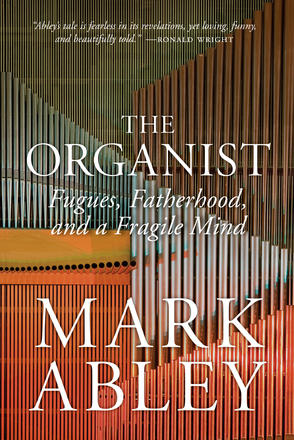The Organist: Fugues, Fatherhood, and a Fragile Mind
University of Regina Press, 2019
Named one of the Top Ten classical music books of the year: BBC Music Magazine
Shortlisted for the Mavis Gallant Prize for Nonfiction
A portrait of the author’s gifted and troubled father — and of the author through time. To learn about the background to the book, including sound recordings and photographs, please tap here.
“A master class in the delicate art of writing about family — raw and unsparing, yet sympathetic and compassionate.”
Ian McGillis, Montreal Gazette
“In a publishing climate rife with self-serving celebrity memoirs, The Organist’s intimate scale and unstinting, probing honesty give it what should prove to be a more lasting appeal. Mark Abley touches on vexed and timely issues—not only masculinity but also mental illness, immigration and intergenerational tension—and suggests that art can play a role in resolving the conflicts to which they give rise.”
Mike Doherty, Maclean’s
“A fascinating and often beautiful portrait … finely wrought insight … brilliantly unites the personal and the musical.”
BBC Music Magazine
“A very beautifully written and deeply moving book.”
Shauna Powers, CBC Radio
“The Organist is a keenly observed, often elegant account of the transformative power of art and the limits of knowing others, even — or perhaps especially — those we feel we should know best.”
Emily Donaldson, Toronto Star
This short video was filmed by the gifted photographer and videographer John Kenney.
—
Some praise for The Organist from four distinguished Canadian writers:
Ronald Wright, author of A Scientific Romance and A Short History of Progress:
The Organist is a rich and wonderful book, a deeply insightful and moving story of a family’s journey through the 20th century and across the Atlantic. The limelight is on Mark Abley’s withdrawn yet brilliant father, a virtuoso organist and composer whose passion led him from cinema Wurlitzers to the great cathedral instruments of Europe. At the same time it illuminates a father and son, each highly gifted in their different fields, and the women they love. Both men are prone to melancholy and to harsh judgments, especially of themselves. Abley’s tale is fearless in its revelations, yet also loving, funny, and beautifully told.
Martha Baillie, author of The Search for Heinrich Schlögel:
Is it possible for a son to accurately portray his own father? This is one of many questions explored by Mark Abley in his fascinating and deeply moving memoir The Organist, his unflinching coming to terms with the solitude, failures, successes, and death of his father. Told with sorrow, humour, and an infectious hunger to know the ‘real’ Harry Abley, this is a wise and haunting book not to be missed.
Charles Foran, author of Mordecai: The Life and Times:
Beautiful, tender, and raging, The Organist comes from where the best writing usually does—deep emotion affirmed by hard-won experience of how humans are in their relationships, and in their own hearts. It has taken Mark Abley nearly a lifetime to produce the book of his life. Not a moment too late, or too soon.
David Macfarlane, author of The Danger Tree:
“What does a life add up to?” This question is central to Mark Abley’s haunting family memoir, The Organist. Both expansive in the themes it raises and intimate in details required to bring those themes to life, it’s a question that draws on Abley’s talents as a remarkably clear and thoughtful writer.
Looking back, it now appears (sadly, I suppose) that the years Mark Abley was a feature writer at Maclean’s and later, at the Montreal Gazette, were the great years of arts journalism. It was a subject that was taken seriously, and, in Canada, Abley was easily its most gifted and dedicated practitioner. Certainly, he was the most widely read.
The game has changed. To be blunt, it’s grown smaller and more trite. But Abley has not abandoned the reporter’s eye, the sensitivity, and the passion that fueled his journalistic career. Nor (if his writing here is any indication) has he abandoned the poetry that inspired him to become a writer in the first place.
The Organist is a portrait of Abley’s father. It’s the story of a family, as well. But the book’s focus is Henry Abley, organist, choirmaster, music teacher, immigrant, husband, father, and depressive. He was, as Abley writes, “a proud Canadian and a lifelong Englishman; a close friend of almost no one.”
In The Organist, Abley ventures bravely into territory that is, for almost everyone, mysterious: what our parents were like before we, their children, became (so we like to imagine) central to their lives. What The Organist makes clear is that what we don’t know about them is often what we don’t know about ourselves.
“Did you know I was more than you made of me?” This is what the ghost of Henry Abley asks his son in a dream, at the opening of The Organist. It’s a question that runs like the recurrent melody of a fugue throughout this compelling book.

